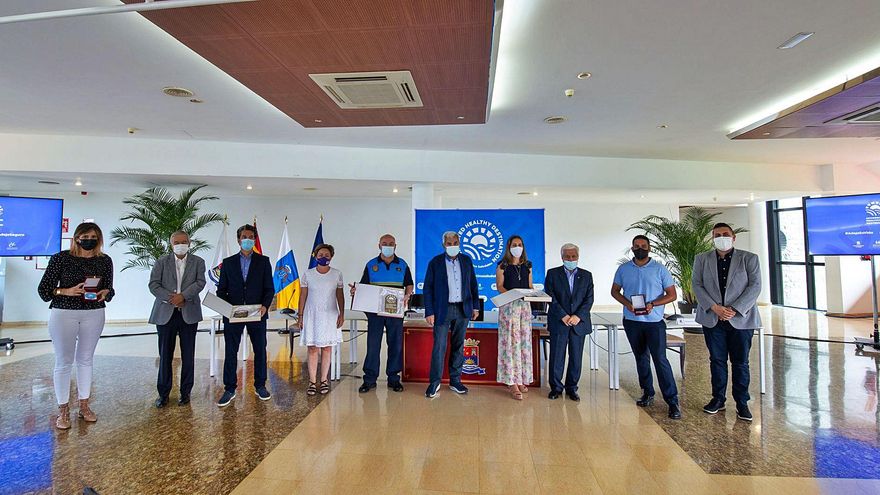
For the pilot test, they selected a range of activities, as well as a shopping center, a hotel, a beach bar, public transport and a municipal building. Specifically, yesterday the first Adeje healthy destination badges were collected by the director of Accommodation at the Gran Hotel Bahía del Duque, Carlota Nieto Morales; the director of operations of the CIO Group, Antonio Díaz de Las Casas; the president of the Number One Group for Siam Mall, Amid Achí; the chief commissioner of the Adeje Local Police, Tomás Estévez; and three taxi drivers from Adeje (licenses LM132, LM178, LM30).
The objectives of the badge, as stated in the regulation approved by the Plenary on June 25, includes public recognition of its holders for incorporating good practices on prevention against the transmission of viruses such as covid-19; provide verified information to the citizens and visitors of Adeje about the establishments and spaces open to the public that apply good practices in the matter and improve the competitiveness of the tourism and services sector of the municipality, generating added value to its offer and resilience in the face of new pandemics and threats to public health.
The mayor of Adeje, José Miguel Rodríguez Fraga, presided over the presentation and delivery ceremony held at the Costa Adeje Tourism Development Center (Cdtca), which was also attended by the rector of the ULL, Rosa Aguilar; the president of the Foundation of the Institute of Tropical Diseases, Basilio Valladares; and the director of the University Institute of Tropical Diseases, Jacob Lorenzo.
Rodríguez Fraga explained that the This accreditation seal is proposed as an element «that would commit us to work and that, in addition, it launched an image of a safe, serious and rigorous destination, that the seal had all the guarantees that the University and the Institute give. It also had to respond to the social need to “generate an image of seriousness and trust with our visitor on security issues.”
The rector highlighted the “knowledge” that the University has provided to the Adeje City Council through the Institute for this initiative. “It is essential to continue working in this alliance for sustainability marked by the objectives of sustainable development.”
Basilio Valladares, ideologist of the badge, assured that “it will not only serve for now but for the future, to create a series of habits and that people who come here feel safe.” Jacob Lorenzo said that the initiative has been a challenge and advocated because “we have to bring science closer to society as a tool to generate trust.”
Some of the requirements
Companies, groups, associations, clubs, etc. You can request this badge from the City Council through the electronic office. They must meet requirements to be supervised by the Institute of Tropical Diseases. Among them, comply with measures, obligations and recommendations established by the competent authorities in preventing the transmission of viruses or contagious diseases. The companies will accredit that they have received adequate training in relation to prevention and good practices against viruses and contagious diseases. Applications must be accompanied by a self-assessment questionnaire, prepared by the Institute of Tropical Diseases, as well as a responsible statement. There are three types of the badge: Gold, Silver and Basic. For the award of the Gold and Silver modalities, they require prior evaluation by the Canary Islands Foundation for the Control of Tropical Diseases.
















